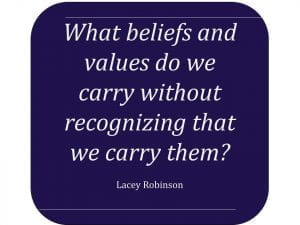After a week of multiple conversations with teacher teams expressing frustration over a myriad of concerns, I am convinced, more than ever, that one of our Professional Learning Community norms, as suggested by Solution Tree and adopted by many of our teams, needs to be revisited and reflected upon: Be solution-oriented and forward thinking.
The concerns and frustrations that teachers share are so very real, and (usually) very valid. In other words, the struggle is real. Expressing frustration is not a sign of weakness or a sign of unwillingness to grow… if it is followed up with thoughts about how to solve the problem, how to remain forward thinking. That follow-up may not necessarily occur at the time of the venting of frustrations. And that is OK. But it is critical that it happens.
The Tricky Balance for Instructional Coaches
As an instructional coach, I can sometimes get caught up in the fray between administrative actions and decisions and teachers’ reactions to them. The work of instructional coaches is tricky: we are NOT administrators or evaluators. We are tasked with supporting teachers in their pursuit of growing as educators so that all of our students can achieve at high levels. One avenue of support is quite simply listening to teachers. In addition to listening and validating, support can be offered through asking questions. Asking questions, not giving answers. We know that questioning is most effective when we artfully craft questions so that teachers can engage in self reflection.
A year ago (almost to the day!), I wrote about my coaching beliefs, which hold true today. Belief #4, “Listen to understand, not to be understood,” is directly tied to questioning… question, then listen. One of my favorite questions to ask (credit to the amazing Julie Steele,) is this: “What is the best thing that could happen if you…?” I love that question because it is free of evaluation or judgement and because it is packed with so much positive potential! In any given situation, there is plenty that can go wrong; asking this question shifts our focus.
Susan Lambert, host of Amplify’s Science of Reading: The Podcast, in Season FIVE Episode 1 (Five seasons of the BEST professional development around the Science of Reading that I have ever had the benefit of listening to!), asks, “Have you ever tried it?” This will be a great question to ask when I hear one of the following refrains (I hear them often and have been guilty of saying many of them, myself): “My students can’t do that because they are so far behind,” “My students can’t do that because they are too young,” “My students can’t do that because they have an IEP,” “My students can’t do that because they have no motivation,” “My students can’t do that because there is no support from home.” To which I will say, again and again, “Have you ever tried it?” “Can you try it again in a different way?” “What is the best thing that could happen?”
The tricky, tricky part of that questioning is asking the right questions at the right time with the right intonation. It is about engaging in “…courageous conversations so that [we] can bubble up our beliefs and values.” I have much room for growth in this area – I too frequently chicken-shit out of questioning for fear of offending or of sounding like I am evaluating or judging.
Two Cringe-Worthy Stories
When I reflect on my own tendencies to stay rooted in (what I now know to be) ineffective instructional practices, two stories come to mind. The first occurred over 10 years ago when I was teaching 5th grade and it was announced that our school district would not be renewing our subscription to Accelerated Reader. I was devastated. I relied heavily on Accelerated Reader to “motivate” my students to read. I believed whole-heartedly in the program and had success stories to back up my beliefs. I was angry with the decision, and blamed “those at the top,” claiming that they were so disconnected from the classroom that they were making a poor decision.
I don’t remember how long it took me to recognize what a brilliant and important that decision (to break ties with Accelerated Reader) was, but I do know that my face can still turn red with embarrassment when I remember the tantrums I threw at the time of the decision. What a glaring display of my own ignorance.

The second story centers around my years in the classroom as a 4th, 5th, and 6th grade teacher. I was convinced that my middle grade students could only be burdened with so much cognitive stretching, so I asked very little of them. At the time, I thought I was asking “just the right amount” from them. I was convinced that too much rigor (one of my least favorite words, thanks to Dean Shareski!) would cause them to shut down, and no learning would occur. I was convinced that a canned curriculum would be too rigorous and boring.
I cringe to recall this story. Especially now that I recognize the power of a high quality curriculum… and understanding the “why” behind the structure of that curriculum. And understanding the strong support that teachers need in implementing a high quality curriculum. Have I ever mentioned how over-the-top thrilled I am that FMCSD has implemented the EL Education Curriculum in grades K – 8???
Examining Our Beliefs
The podcast episode that I referred to earlier is an absolute must listen! In this episode, Susan Lambert interviews Lacey Robinson, Chief Executive Office of UnboundEd. As with every episode, this one is packed with wisdom (Susan’s word!). Susan and Lacey discuss so many powerful topics, many of which connect to the questions that I was referring to earlier. When we are filled with frustrations and concerns, or beliefs that our students are unable to learn at high levels, perhaps a first move would be to step back and examine our beliefs.

Lacey discusses the beliefs and values that we carry and don’t even recognize that we carry them. She discusses the inequities that our systems have created. Her thoughts are so relevant in all instances: when we operate in systems of inequity, when we hold on to instructional practices “because they have worked for me and my students in the past”, when we fail to recognize that what works in “my classroom,” may not work in the larger system.
Susan Lambert talks about the importance of introspection, of examining ourselves and our instructional practices. This can be so difficult to do, especially when we believe that what we are doing is working. Brené Brown might call it leaning into vulnerability – it’s scary, but it is critical.
The introspection Susan speaks of could be the very thing we need to engage in the difficult task of suspending our beliefs. It could be what drives us to truly marinate in the questions about our practice that are sent our way. It could be just the thing we need to be solution oriented and forward thinking.
A Noble Profession
Teaching. Is. Hard. When we are faced with administrative actions and decisions that we do not agree with, when we are drowning in the day to day struggles of teaching, when we get wrapped up in the false belief that our students are not capable of high levels of learning, perhaps we can pull ourselves out of such despair with some inspiration from the one and only Dr. LaTonya Goffney. George Couros dropped this quote from Dr. Goffney in a recent announcement that Because of a Teacher will have a sequel!
“Think about that — education on your very worst day, you will still be somebody’s child or some child’s best hope. Congratulations on choosing the noblest of all professions. If you commit to adding value, subtracting negativity, and multiplying hope, your students will be the benefactors. Do not let anyone stop you from fulfilling your dream and helping students realize their dreams.”